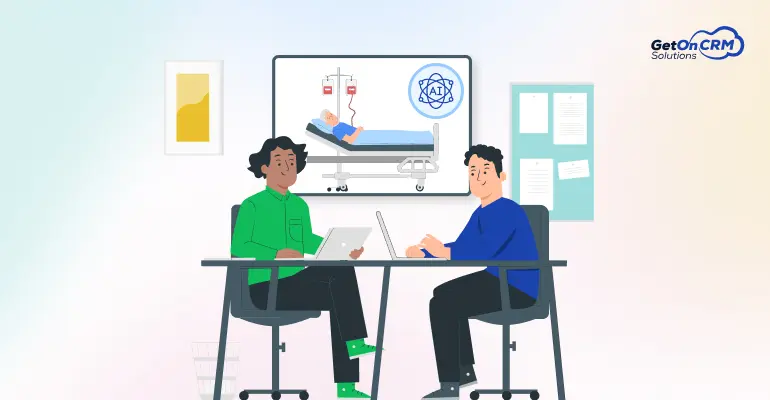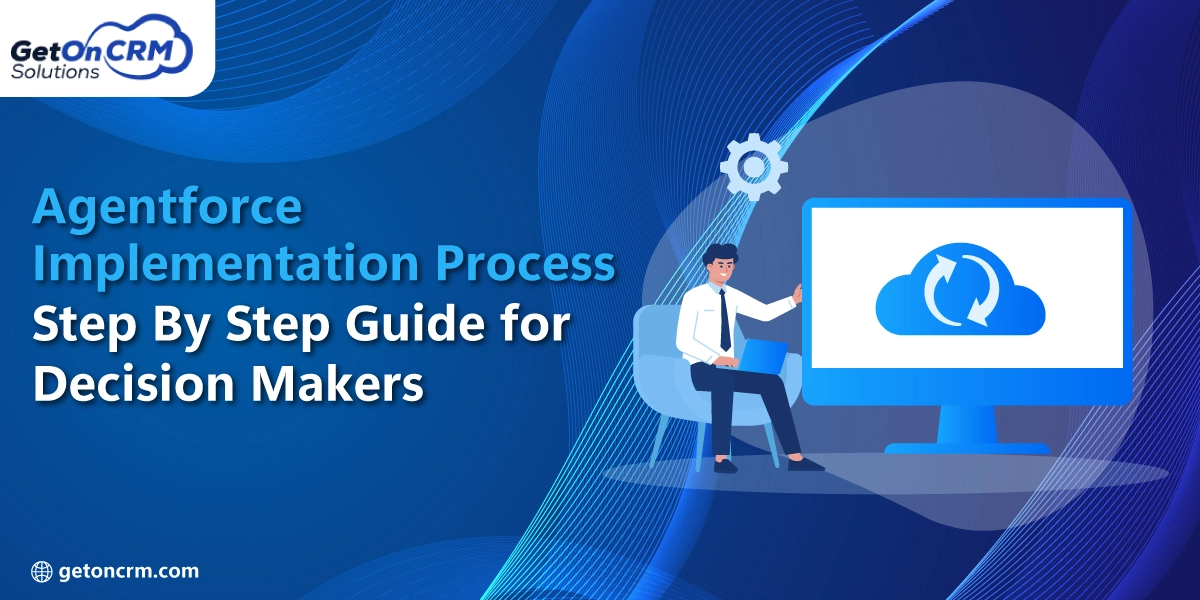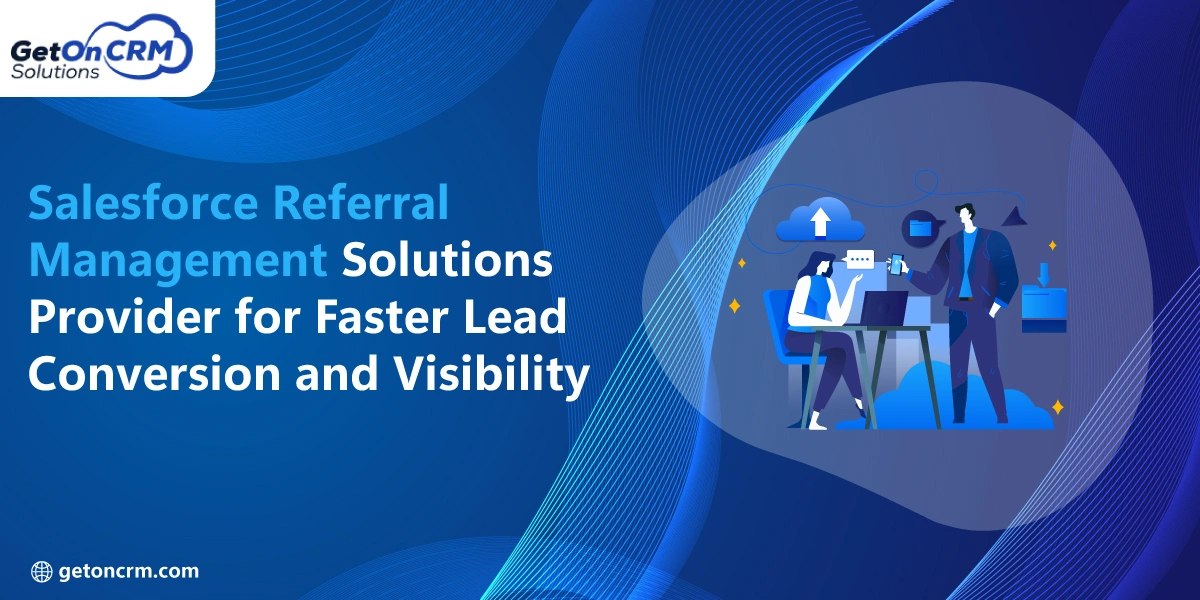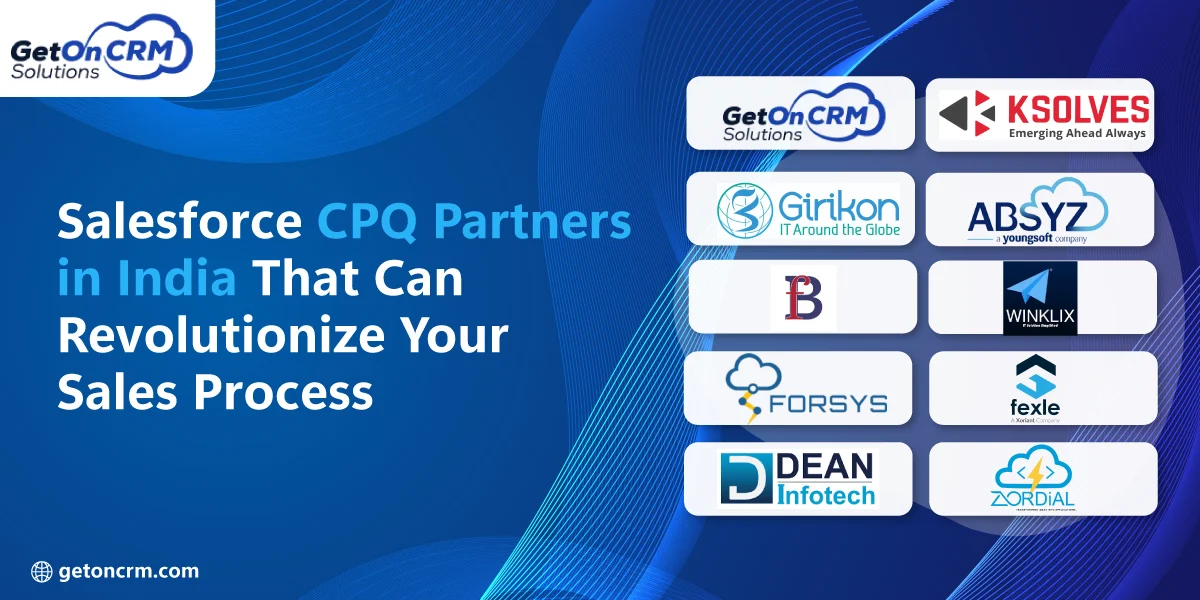Today, the healthcare industry is transformed through contemporary tools and technologies. AI in patient care has become the norm in the medical sector to improve not only the results but also overall administration and clinical workflows. It won’t be an exaggeration to say that Artificial Intelligence in healthcare is no longer a futuristic vision; it is a present reality.
Recent market analysis quotes remarkable growth in healthcare CRM adoption. According to Emergen Research, the global CRM market size in the healthcare industry is likely to reach US$26.35 billion by 2027, witnessing a CAGR of 13.6% in the said period. This trend is mostly due to the implementation of AI-powered healthcare CRM systems in various medical facilities and setups.
Another detailed report on discovery partners mentions that healthcare companies and organizations that harness AI healthcare solutions report a 45% decrease in patient readmission rates and a 40% reduction in patient wait time.
Platforms like Salesforce Health Cloud are at the forefront of the shift we see in the healthcare sector. To add to that is the specialized AI technology integration with Salesforce Einstein to help with automations. Such systems represent patient care in the new era of healthcare automation by storing patient data and enhancing patient care delivery without any human intervention.
Let us go through a detailed guide on AI-powered transformation for patient management. The basics first.
What is AI-Powered Healthcare CRM?
A healthcare CRM system is an epitome of evolution in patient relationship management tools. These specialized platforms are crafted to handle the whole patient journey – from initial appointment to health checkup through to treatment and even follow-up care. Unlike obsolete record-keeping systems, modern healthcare CRMs incorporate AI in patient care to turn complex data into actionable tasks.
AI-powered Healthcare CRM systems serve as a centralized point where patient demographics, communication logs, treatment plans, and medical histories converge. What makes healthcare customer relationship management systems different is their ability to utilize Artificial Intelligence in healthcare to trace patterns, recommend timely intervention, and predict further health risks. In such a situation, using Health Cloud in healthcare adds to the digital experience.
For instance, a healthcare CRM system could analyze a hypertensive patient’s historical data to anticipate when they are likely to need intervention and then automatically arrange needed health checkups.
Key Features of AI-powered Healthcare CRM Systems
The most effective AI-enabled healthcare CRMs possess many critical capabilities that distinguish them from other general CRM solutions:
- Centralized patient data management system: These platforms aggregate information from EHRs, patient portals, and wearable gadgets, etc. into an easily accessible interface. This feature eliminates data silos that otherwise bother most healthcare setups.
- Healthcare CRM tools: Beyond general contact management, healthcare CRMs include dynamic patient segmentation and automated communication workflows with patient experience tracking, all boosted by AI-powered healthcare CRM capabilities.
- Predictive analytics engines: Smart systems forecast patient no-shows and identify risks in individuals while suggesting the best line of treatment by applying ML to historical and real-time information.
Role of AI-Powered CRM in Enhancing Patient Care
The real advantage of CRM for patient care becomes apparent when doctors consider specific clinical cases. AI-enabled patient care can enhance patient outcomes and hence help them improve their conditions.
For instance, consider a cardiology practice backed by AI-enhanced CRM:
- Healthcare CRM for patient care automatically traces patients overdue for follow-up by analyzing their condition severity and appointment schedules from the past.
- It then prioritizes outreach to patients with higher risks. Personalized communication is initiated based on each individual’s preferred correspondences and language.
- For patient appointment scheduling, the CRM analyses the availability of the healthcare provider and typical visit time, and even traffic congestion for an optimal time slot.
The Role of AI in Healthcare CRM Systems
The integration of Artificial Intelligence in healthcare represents one of the most essential forward steps in medical technology since the advent of EHR. Salesforce in healthcare is the best example that showcases the latest technologies facilitating healthcare services like never before.
Modern AI agents for healthcare, like those built with Agentforce and Einstein, go way beyond general automation. Taking a step ahead, the use of Einstein 1 for automation is capable of supporting the most complex workflow for better decision-making. Through NLP, it continuously learns from new data. The use of AI in Salesforce can perform tasks that traditionally require human cognitive skills:
- Interprets complex clinical notes and identifies relevant patient data
- Analyzes medical imaging with precision and reveals critical information to physicians
- Processes thousands of research papers and suggests evidence-based medicines
In the context of healthcare CRM integration, Artificial Intelligence can transform these platforms from passive datasets into active patient care plans.
How does AI Improve Patient Data Analytics?
The use of AI in CRM in healthcare has brought a revolution in how healthcare experts derive value from patient information:
- Risk Stratification: Systems automatically flag patients with high risks of complications, disease progression, or hospital readmission by applying predictive models. As a result, health experts can prioritize resources.
- Pattern Recognition: AI algorithms identify multifaceted relationships in databases too large for human agents. A healthcare CRM system can also detect patients with a specific combination of signs and symptoms, medications, and lifestyle factors that affect their health.
- Longitudinal analysis: Unlike traditional methods to analyze, wherein snapshots of data were examined, AI-powered systems can track patient information over time to identify trends that signal deteriorating health even before signs surface.
Automating Routine Tasks with Artificial Intelligence
One of the best benefits of AI in Salesforce and other healthcare CRM platforms is that you can automate time-consuming administration. Such automation directly shares its part in optimizing patient care by sparing clinicians from focusing on better patient treatment strategies and personal bonding. AI-powered Healthcare CRM systems can regain a couple of hours per day that were otherwise spent on tedious administration tasks.
Automated Documentation
Natural language processing, or NLP, can easily generate structured data in the CRM by converting voice notes from clinicians. This reduces documentation time up to 30 percent.
Intelligent Patient Scheduling
Intelligent systems can analyze doctors’ availability and patient preferences. It can also identify visit types and historical no-show information to automatically book the best possible appointments and minimize gaps in doctors’ schedules.
Billing Automation
Artificial Intelligence can review claims before submissions and can flag potential denials or hurdles in claims. It can also suggest corrections to dramatically enhance revenue cycle efficiency.
AI-Driven Decision Support for Healthcare Providers
The impact of healthcare CRM on patient care becomes specifically evident in complicated cases. For instance, CRM solutions for patients in clinical trials can have AI to match eligible volunteers with a proper study based on dozens of exclusion and inclusion criteria. This accelerates the research recruitment and results.
Treatment Recommendations: A system alerts a doctor that a patient’s combination of certain conditions can make them suited or unsuited for a specific medication or line of treatment.
Diagnostic Assistance: AI suggests potential diagnostic signs based on shreds of evidence by comparing patient symptoms, history, and lab results, all based on medical data.
Resource Allocation: During flu seasons or pandemics, AI can analyze regional outbreaks of infection rates and patient vulnerability. This helps hospitals plan staffing and supply needs.
Benefits of AI-Powered CRM Systems in Patient Care
The integration of AI-powered healthcare CRM solutions is providing transformative advantages throughout every facet of the patient case lifecycle. Intelligent systems improve operational efficiency, and they remarkably improve the quality and personalization of patient care services.

Personalization of Care Plans
Modern healthcare CRM systems use ML algorithms to study a huge amount of data, from genetic markers and treatment responses to social lifestyle. It can create an individual care plan that is beneficial later.
For chronic disease patients, AI systems in healthcare could notice that blood glucose levels regularly spike after specific meals and automatically suggest dietary changes through the patient portal.
The use of AI in CRM in healthcare adds precision to all the recommendations and makes Machine Learning easier, ultimately improving patient outcomes.
Predictive Analytics for Better Outcomes
The predictive ability of AI in patient care is revolutionizing preventive medical practice. These intelligent systems identify patients at risk of developing specific conditions by processing historical data from plenty of similar cases.
As a result, a doctor can take steps even before the clinical symptoms appear. For instance, a cardiology practice using Salesforce healthcare CRM for patient management triggers alerts when a patient’s vital signs, lifestyle changes, and family medical history indicate any forthcoming cardiovascular diseases.
Cardiologists can have early intervention and prevent hospitalization, demonstrating the best impact of healthcare CRM on patient care.
Efficient Patient Appointment Scheduling and Management
AI in Salesforce for healthcare solutions has transformed the administration of clinics through intelligent patient scheduling. There is a remarkable 20-30% better utilization of medical staff and clinical time. For complex cases like CRM solutions for patients in clinical trials, the system can also automatically pair research coordinators and multiple specialists.
- Historical appointment duration for a particular procedure with code
- Patient travel time based on their residential sites
- Doctors’ specialty and preferred patient types
- Previous no-show patterns
Real-Time Patient Interaction and Support
Introduction of AI-enhanced virtual health assistants has brought up new paradigms for patient engagement. Intelligent systems like Agentforce for healthcare are shaping healthcare by providing around-the-clock services through natural language conversations and many other functionalities. AI systems can:
- Explanation of healthcare instructions in multiple languages
- Detect stress in patients’ communications during telehealth sessions
- Demonstrate physiotherapy exercises through AR
- Trigger urgent signs to human experts
Enhanced Communications with Patients
Healthcare CRM integration can offer an omnichannel communication platform integration to personalize interactions at scale. The system can automatically.
- Vary communication styles like formal or informal based on the demographics of patients
- Send SMS reminders in a preferred language
- Adjust message timings by evaluating patient schedules and likely responses
- Falg patients who are not engaging with medical education
Operational Efficiency
The behind-the-scenes impact of Artificial Intelligence in healthcare CRM systems is quite impressive, these systems are built to bring down administration costs up to 30% by automatizing prior authorization, claim processing, and insurance verifications. The AI-powered healthcare CRM systems can:
- Generate bill codes based on clinical documentation
- Schedule medical staff through demand analysis
- Trace underutilized services that can be improved
- Optimize medical inventory based on the number of patients
Streamlining Patient Data Management with AI-Driven CRMs
Healthcare CRM systems deployment ensures that you can effectively address long-standing challenges in patient care coordination and continuity. The AI-powered platforms can solve the handoff problems. Here is how:

Centralized Patient Data Management
The modern patient data management system within an AI-powered CRM serves as a one-point source of truth throughout the patient care ecosystem. Doctors can also get a comprehensive view to make clinical decisions. The healthcare CRM integration also ensures that the data flows securely between authorized persons while maintaining HIPAA compliance.
These platforms eliminate the fragmented medical records that traditionally bother administrators by integrating with electronic health records, wearable gadgets, and pharmacy systems. For example, physicians can view whether their patients:
- Have been non-compliant with their blood glucose monitoring
- Took their new prescriptions
- Had seen radiologists after the tests were carried out
Automating Follow-Ups and Reminders
The AI in patient care capabilities pushes their horizons to intelligent follow-ups that go beyond simple reminders. AI systems in healthcare can:
- Identify medication refill patterns and can suggest non-adherence
- Detect when patients did not upload specific photos of a wound
- Trigger notification and suggestion for each scenario
- Notice that the heart rehabilitation patient’s exercises have declined
It is worth noting here that Einstein GPT is shaping healthcare follow-up protocols. The platform uses natural language processing to build personalized recovery plans based on patient progress charts.
Improving Patient Retention Through Planned Communication
Sophisticated CRM for patient care platforms can automate marketing techniques as the healthcare needs evolve. Case studies are available that showcase that platforms such as Salesforce for better patient care excel at targeted patient engagement and, therefore, maintain better bonds with their patient populations. Such systems identify:
- Individuals who are likely to get less engaged in patient care based on interactions
- Patients due for preventive screenings as per patient risk factors and guidelines
- Opportunities for medical intervention even before issues develop
Intelligent Virtual Assistant for Patient Engagement
The latest generation of AI-enhanced virtual health assistants has transformed patient support. The use of Einstein1 and Agentforce for healthcare solutions is a prime example of guiding patients for wound care instructions and recognizing the condition through uploaded photos.
Overall, AI application in healthcare can improve patient support through:
- Context-aware conversation: remembers previous discussions
- Clinical triaging: access symptom urgency
- Emotional intelligence: NLP detects stress in patient messages
- Seamless telehealth platform integration: document visits directly into the CRM without additional data entry
- Real-time health monitoring: smart gadgets streaming data directly into CRM in real time
Security and Privacy In AI-Powered Healthcare CRM Systems
As healthcare customer relationship management systems can tackle sensitive data, stringent security measures are a big concern. You need to take care of the following:
- Data encryption and privacy protocols
- Compliance with healthcare regulations such as HIPAA and GDPR
- Ensuring safe handling of sensitive patient information
Future Trends in AI-Powered Healthcare CRM Systems
The immense revolution of Artificial Intelligence in healthcare promises more transformation in the near future. Here are a few to mention:
- Advanced biosensors detecting molecular biomarkers
- Real-time patient care through live vital sign streaming
- AR glasses for movement patterns
- Environmental data from smart home devices
- Real-time treatment guidance during critical care
- Multimodal communication combining AR/VR, text, and voice
- Automation of staff deployment across departments
Ready for Patient Care Management Transformation Through AI?
The integration of AI in patient care through advanced healthcare CRM systems showcases one of the remarkable advancements in modern medical science. From AI-powered healthcare CRM platforms predicting risks with Agentforce or Einstein for healthcare solutions providing all-time virtual support, contemporary technologies can create a new standard for patient care in the new era of healthcare automation.
If you want marked improvements in preventing screening rates, reduction in hospital readmissions, and a significant reduction in clinician burnout because of administration, opt for customized patient management through AI solutions.
Frequently Asked Questions on AI-Powered Healthcare CRM Systems for Patient Care
What is an AI-powered healthcare CRM system?
It’s a platform that leverages artificial intelligence to manage patient relationships. It tracks patient data, automates outreach, and predicts needs—helping providers deliver personalized, timely care.
How does AI in healthcare CRM improve patient care?
AI offers predictive insights on patient behavior, risk factors, and treatment outcomes. This helps clinicians intervene earlier, tailor care, and improve overall patient experience and health outcomes.
Can this CRM system integrate with EHR/EMR systems?
Yes. AI-powered healthcare CRMs typically support integration with EHR/EMR systems. This ensures patient history, lab results, and prescriptions sync seamlessly, reducing duplication and errors.
Is AI healthcare CRM secure for patient data?
Yes. These CRMs incorporate encryption, role-based access, and compliance with HIPAA and other regulations. They prioritize data privacy to protect sensitive health and patient records.
Is the AI CRM system suitable for clinics and hospitals of all sizes?
Absolutely. Whether small clinics or large hospitals, the system scales to meet needs. Custom modules and flexible pricing let organizations adopt features gradually as they grow.
How fast can an organization implement an AI healthcare CRM?
Implementation time depends on complexity, integrations, and data migration. Simple setups may take weeks; full-scale deployments with integrations may take a few months with planning and testing.



















